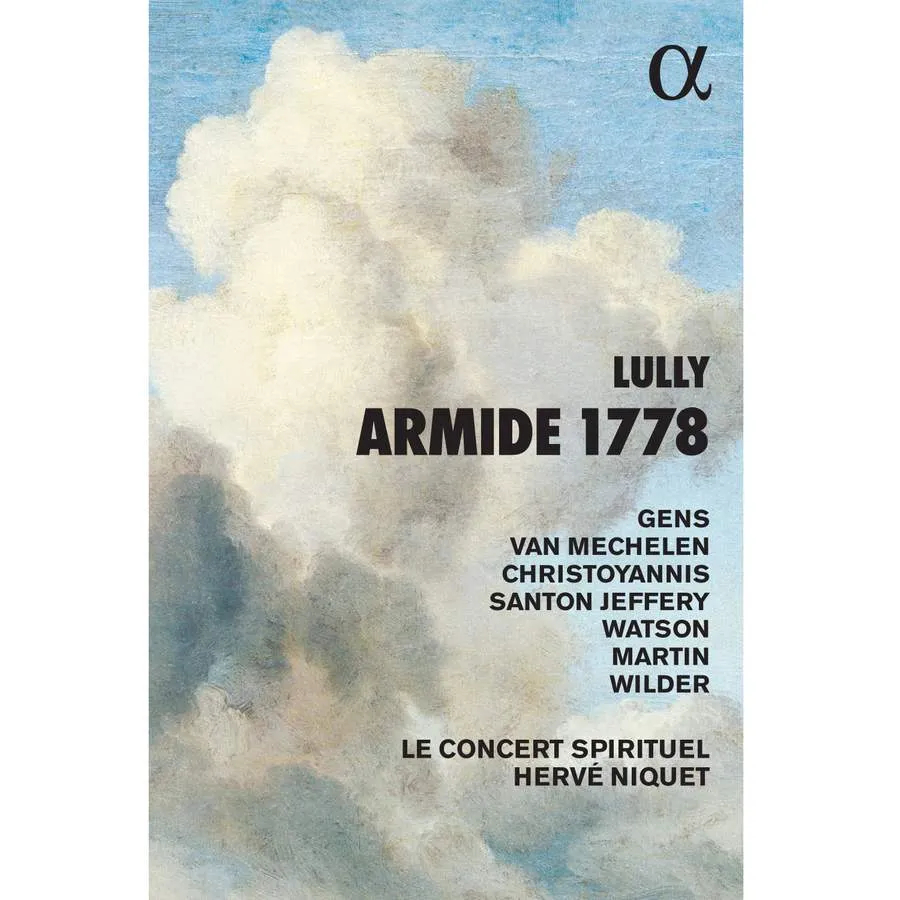
Lully Armide 1778 Katherine Watson, Véronique Gens, Chantal Santon Jeffrey (soprano), Philippe-Nicolas Martin, Reinoud van Mechelen, Zachary Wilder (tenor), Tassis Christoyannis (bass); Le Concert Spirituel/Hervé Niquet Alpha Classics ALPHA973 136:36 mins (2 discs)
In 1778, a huge revival was afoot at the Paris opera: Armide. The work, Lully’s last tragédie en musique, had by mid-century fallen from the repertoire. But in 1777 Gluck had the cheek to re-set its libretto. A culture war roared to life, ranging Gluckistes against Lullistes. To advance the Lulliste cause, the director of the Paris opera asked Louis-Joseph Francoeur to re-invent Lully’s score as one vastly superior to Gluck’s. For reasons unknown, Francoeur’s Armide never reached the boards. Only in 2019 did the 1778 Armide get its world premiere, with top talent – scholars, singers, band – brought together for a co-production by the Versailles Centre for Baroque Music and Le Concert Spirituel led by Hervé Niquet.
Francoeur altered Lully’s masterpiece drastically, inserting his own complex orchestral movements: a symphonic overture, 15 new dances and many interludes. He changed Lully’s airs, revised the final act, and rewrote all vocal accompaniment. In this new Armide, Francoeur reveals himself to have been a master of counterpoint, texture and lyricism; his woodwind solos are especially ravishing. In his application of timbral colour, Francoeur has the dexterity of an Impressionist.
This project’s performers are, from first note to last, as outstanding as the score. Véronique Gens delivers a career-defining performance as Armide, a sorceress and seductress of volcanic power. She bewitches the hero Renaud, inducing him to quit Christian knighthood to be with her. Despite visions of her downfall, Armide does not slay Renaud as she had first planned but instead falls in love with him. Once Renaud’s compatriots turn up and restore his reason, he abandons her. Heart-broken, Armide destroys her realm and completely vanishes.
Armide’s character fits Gens like a glove: her sexy, dark-hued instrument, blistering line and dramatic intensity project a woman both commanding and vulnerable. Where Francoeur wrote instrumental solos to shadow her melody, Gens adjusts her moves to embrace the accompanist’s performance. She paces herself divinely in the climactic scene of Francoeur’s version (‘Ciel! ô mortelle peine!’). In Lully’s score, Armide’s character-reveal had fallen much earlier, with the Act II ‘Enfin, il est en ma puissance’; Francoeur has it come in Act V, with Armide’s scorching denunciation of Renaud and bitter outpourings after his exit. These make Armide the hero, and Renaud the villain, of the 1778 version.
Niquet is also enchanting. No pitch, articulation or pause goes unconsidered, yet his care yields only spontaneity. Thanks to the mix of muscle and talent at Niquet’s disposal – his orchestra has 33 players; his chorus, 26 singers – divertissements shape-shift from the sensually intimate to the sublimely noble. All vocal soloists shine in turn. Award-winning Belgian tenor Reinoud Van Mechelen as Renaud stands out, handling his high tessitura with ease and projecting youthful passion.
For the calibre of its performances as much as for its originality and careful reconstruction, this Armide is among the most brilliant opera projects of recent years.
Berta Joncus